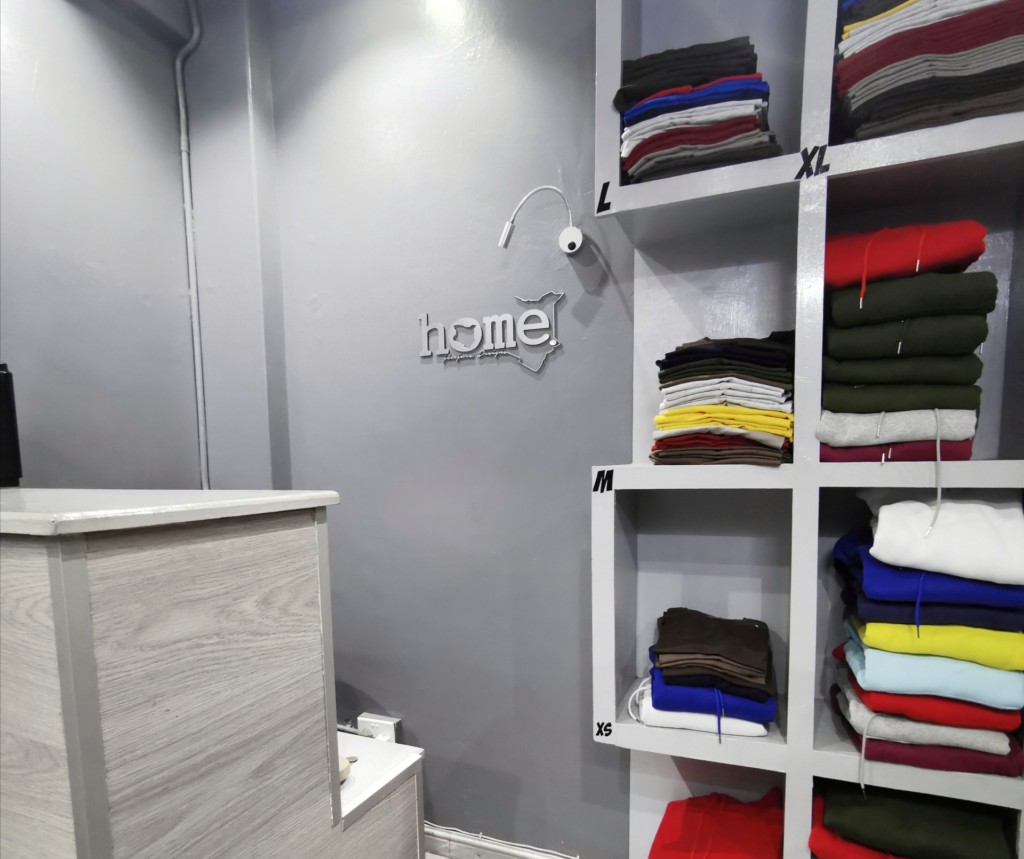It is 8:00 a.m., on a chilly Tuesday morning, in the uptown part of Nairobi’s Central Business District. Ramadhan Ngombo, or Rama as many call him, is doing some last-minute dusting in preparation for a new day of business.
Rama, a 26-year-old about 5’3 tall with neatly made short dreadlocks, works at a clothing shop in Nairobi. He narrates how COVID-19 has impacted their business.
“The last three months have not been easy. We have had to adjust a lot of things since the pandemic and the sales have not been as high as they were before,” he says.
Rama works for a clothing brand ‘home_254’. The company makes and sells hoodies, t-shirts, sweatshirts, sweatpants, jackets and other custom-made apparel.
And like many businesses, Home_254 has also faced challenges due to COVID-19 which was first reported in the country on 13th March 2020. Rama explains how the disease has changed their operations and some of the measures they have put in place as Home_254 to mitigate the spread of the disease in their place of business.
“As a precaution, we nowadays do not allow as many customers as we did before to enter the shop, and those who come in have to maintain the 1.5m social distance. We also provide them with hand sanitizers when they enter the shop,” Rama says.
“With the few numbers of customers coming into the shop, our sales have not been as high as before. We even had to reduce our working hours due to the dusk to dawn curfew, which has also impacted negatively on us,” he says.
According to Ramadhan, even with all these measures, the shop’s sales have not been as good as they were before.
The dusk-to-dawn curfew imposed by the government meant that most businesses had to re-adjust their working hours and Home_254 is not an exception.
“Before the pandemic, we opened the shop at 10:00 a.m. and closed at around 8:00 p.m. Sometimes we could extend closing hours to 10:00 p.m. to allow customers to come in late to pick up their orders; we even did all-nighters depending on the workload, but nowadays we have to close early to ensure we are all at home by the time of the curfew. It is good that the President extended the start to 9:00 pm,” he adds.
When the curfew was first imposed and things were a lot more serious, the shop only opened for customers twice a week, Wednesdays and Saturdays, and that was only for pick-ups and deliveries. Luckily, the company has a website where its customers can make orders from.
“The customer chooses the apparel and size they want through our website or our social media platforms. They pay a deposit through our till number, then we proceed to make the apparel. After we make it for them, we deliver through motorbikes and parcels at a fee according to where they are ordering from. The disadvantage with deliveries is that many people feel that it is added expenses especially those who are in Nairobi and could easily come to the shop,” he explains.

Initially, orders used to take two to three working days to be ready and delivered but due to the curfew times, customers now have to wait at least five working days before getting their apparels.
Even though the business has been affected by the pandemic, Ramadhan still has a cheerful character. He only hopes that the pandemic will pass and things go back to normal soon.
“I have not been able to go home since the pandemic. I was planning to take leave but the cessation of movement into and out of Nairobi and Mombasa counties made me change my plans,” he jokingly says.
Job Brian is the Founder and CEO of Home_254. The 28-year-old SME owner says they have had challenges getting fabric since the pandemic.
“We ship our fabric from China, which as many know locked down for some time due to the pandemic. We usually ship the fabric in bulk, so when the lockdown in China happened we had quite some stock but unfortunately, we ran out of fabric. This means we cannot make the apparel which in turn translates to no sales being made,” Job says.
“With low sales and not much to do, we had to temporarily let go of some of our staff so that we can keep business afloat,” he added.
At the shop, we meet Maureen Atieno. She has been shopping with Home_254 for a while now.
Maureen is a 22-year-old Jomo Kenyatta University of Agriculture and Technology (JKUAT), student.
Like many young people her age, the final-year Food Science and Technology student likes to shop. She however says shopping has not been as fun as it was before the pandemic.
“The constant hand washing and sanitization, every time one enters a shop or store, is so annoying. Especially these stores that provide water and soap, some don’t even have a place where the dirty water is collected so when one is washing their hands, dirty water splashes on them, which is so irritating,” she says.
According to Maureen, that is not the only disadvantage, she also complained about the long queues brought about by the pandemic and the fact that one always has to be very careful when picking anything in the shops.
With such conditions, Maureen says it is better to shop online in the comfort of your home. However, she says that as much as online shopping is comfortable, it has its disadvantages.
“For one, it is costly. When I buy something online, I have to pay the delivery fee which is costly. The other disadvantage is that when shopping online, you might not get the right size of whatever you are buying because you do not have the chance to try it on. The other thing is that with online shopping, it takes more time for you to get whatever you are buying unlike when you visit a shop physically where you get whatever you want there and then,” she explained.
“Apart from paying the delivery fee, some businesses have pay-bill numbers instead of till numbers, which means I also get charged when paying for an item,” she added.
Just like Ramadhan and Job, Maureen also hopes things go back to normal soon.
******
With less than 10 days until the lapse of the current dusk-to-dawn curfew and the cessation of movement orders imposed by the government, many businesses like Home_254 as well as many Kenyans can only hope that there will be no extension this time.













